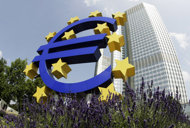ECB on hold as debt storms calm

The ECB's governing council, at its regular monthly policy meeting, voted to leave its key interest rate unchanged at 1.0 per cent for the third month in a row after it pumped more than 1.0 trillion euros ($1.3 trillion) into euro area banks since December to avert a dangerous credit crunch.
The operations, known as long-term refinancing operations or LTROs, have been "an unquestioned success," ECB chief Mario Draghi told a news conference here.
"The risk environment has improved enormously. Markets have reopened. Even the interbank market ... has also started working slightly better. Certainly, we see many signs of returning of confidence in the euro," Draghi said.
But he stressed that the LTROs were only temporary measures and that governments should not ease up on their efforts to get their finances in order.
"Now the ball is in the governments' court," he said. "They should continue their reforms" and banks must continue to "repair their balance sheets."
The LTROs have "created the situation where these efforts can be undertaken. Governments should not be complacent," he said.
The main aim of the operations was for banks to lend the money to households and businesses and Draghi insisted that this was working.
Of the 800 banks that borrowed the 529.5 billion euros at the second LTRO last week, 430 were small banks in Germany which traditionally lend to the small and medium-sized enterprises (SMEs) which form the backbone of the German economy, he said.
"This money is now closer to the SMEs than it was before, which was one of the arguments to involve a very large number of participants," Draghi said.
But he steadfastly refused to be drawn on whether the ECB had any further such operations up its sleeve.
Since taking over at the ECB's helm in November, Draghi has been busy seeking to put out the crisis fires on a number of fronts.
In December, the ECB cut rates to bring its benchmark lending rate back to its previous historic low of 1.0 per cent, effectively reversing last year's two earlier rate hikes.
It has eased the rules on bank collateral and cut banks' minimum reserve ratios, and after long resisting calls to take a haircut or writedown on its holdings of Greek bonds, it did finally agree to forego profits on them.
In the wake of all these different measures, ECB watchers predict the central bank will now sit back and see how the measures pan out into the real economy.
In its latest updated macroeconomic forecasts, the ECB cuts its growth projections for the 17 countries that share the euro, and raised its forecasts for inflation.
The bank is now expecting the eurozone economy to contract by 0.1 per cent this year, compared to its previous forecast for growth of 0.3 per cent.
Similarly, the 2013 growth forecast was revised downwards, too, to 1.1 per cent from 1.3 per cent.
At the same time, area-wide inflation was to reach 2.4 per cent in 2012, way above the ECB's target, instead of the previous projection of 2.0 per cent.
Nevertheless, Draghi insisted it was not all gloom and doom.
"We expect the euro area economy to recover gradually in the course of this year," he said.
However, the remaining tensions in euro area sovereign debt markets would continue to dampen the underlying growth momentum, Draghi warned.
The outlook for growth "remains subject to downside risks. They notably relate to a renewed intensification of tensions in euro area debt markets and their potential spillover to the euro area real economy," he said.
Analysts said the ECB was not likely to cut key rates any further for the time being.
"All in all, the case for further rate cuts remains a marginal option," said Newedge Strategy analyst Annalisa Piazza.
"Further accommodation via 'non-standard' measures is also unlikely near term as the ECB seems to be willing to see the effects of the exceptional past measures on the real economy first," she said.
Carsten Brzeski at ING Belgium similarly believed that "further rate cuts seem to be off the table."
And UniCredit economist Marco Valli said he remained "happy with our call that the ECB will be on hold both on conventional and unconventional policy for a long time."
What the stars mean:
★ Poor ★ ★ Promising ★★★ Good ★★★★ Very good ★★★★★ Exceptional
Related Contents
Latest News
More News
- Cashless payments hit 28 times GDP in 2025 (February 04, 2026 | 18:09)
- SSIAM and DBJ launch Japan Vietnam Capital Fund (February 04, 2026 | 15:57)
- Banks target stronger profits, credit growth in 2026 (February 04, 2026 | 15:43)
- Vietnam on path to investment-grade rating (February 03, 2026 | 13:07)
- Consumer finance sector posts sharp profit growth (February 03, 2026 | 13:05)
- Insurance market building the next chapter of protection (February 02, 2026 | 11:16)
- NAB Innovation Centre underscores Vietnam’s appeal for tech investment (January 30, 2026 | 11:16)
- Vietnam strengthens public debt management with World Bank and IMF (January 30, 2026 | 11:00)
- Corporate bond market poised for stronger growth cycle (January 28, 2026 | 17:13)
- Vietnam's IPO market on recovery trajectory (January 28, 2026 | 17:04)

 Tag:
Tag:




















 Mobile Version
Mobile Version